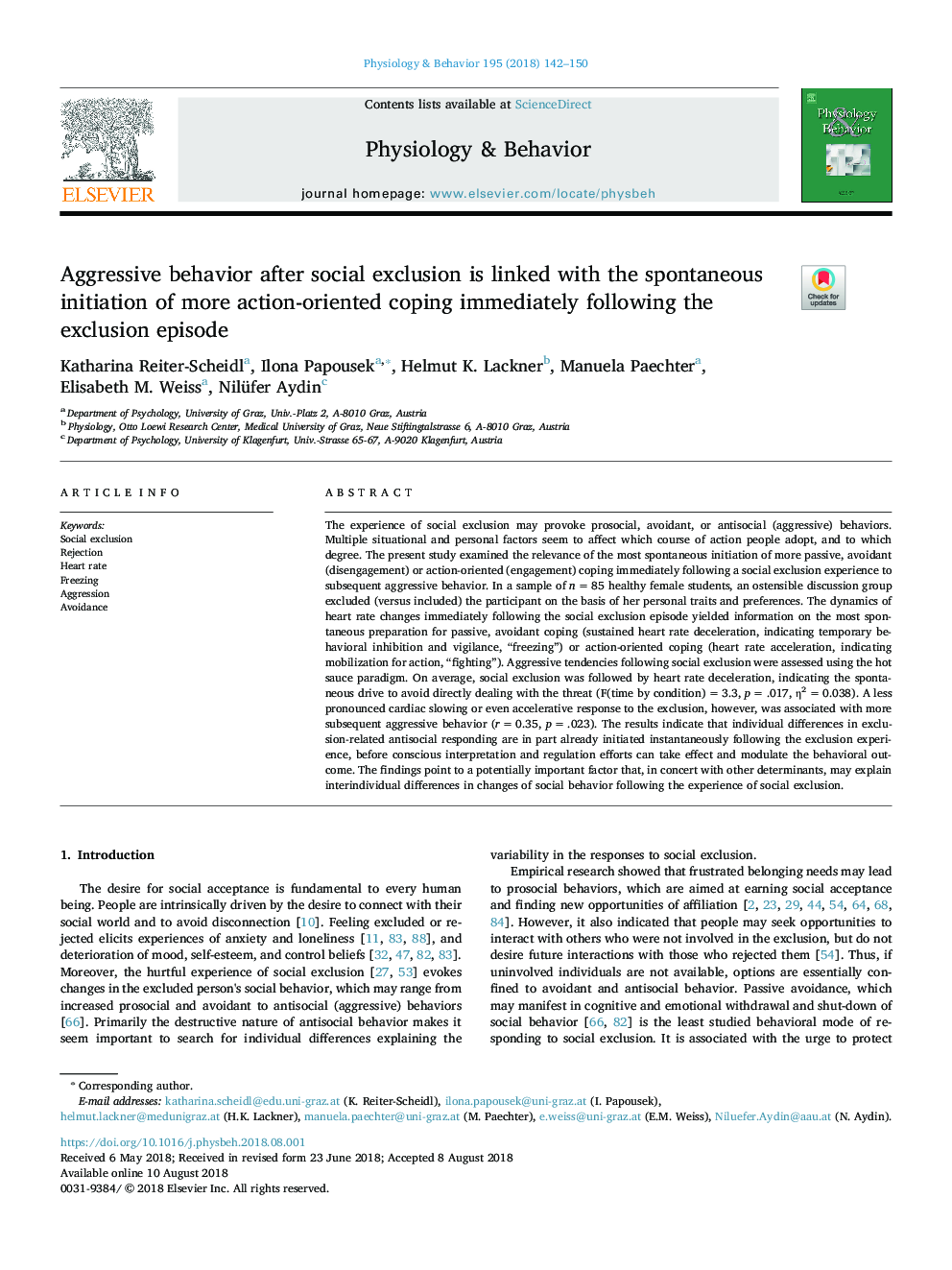| کد مقاله | کد نشریه | سال انتشار | مقاله انگلیسی | نسخه تمام متن |
|---|---|---|---|---|
| 8650221 | 1571123 | 2018 | 9 صفحه PDF | دانلود رایگان |
عنوان انگلیسی مقاله ISI
Aggressive behavior after social exclusion is linked with the spontaneous initiation of more action-oriented coping immediately following the exclusion episode
ترجمه فارسی عنوان
رفتار تهاجمی پس از جداسازی اجتماعی با شروع خود به خود مقابله با اقدامات گوناگون بلافاصله پس از بخش جدایی
دانلود مقاله + سفارش ترجمه
دانلود مقاله ISI انگلیسی
رایگان برای ایرانیان
کلمات کلیدی
محرومیت اجتماعی، طرد شدن، ضربان قلب، انجماد پرخاشگری اجتناب از،
موضوعات مرتبط
علوم زیستی و بیوفناوری
بیوشیمی، ژنتیک و زیست شناسی مولکولی
فیزیولوژی
چکیده انگلیسی
The experience of social exclusion may provoke prosocial, avoidant, or antisocial (aggressive) behaviors. Multiple situational and personal factors seem to affect which course of action people adopt, and to which degree. The present study examined the relevance of the most spontaneous initiation of more passive, avoidant (disengagement) or action-oriented (engagement) coping immediately following a social exclusion experience to subsequent aggressive behavior. In a sample of nâ¯=â¯85 healthy female students, an ostensible discussion group excluded (versus included) the participant on the basis of her personal traits and preferences. The dynamics of heart rate changes immediately following the social exclusion episode yielded information on the most spontaneous preparation for passive, avoidant coping (sustained heart rate deceleration, indicating temporary behavioral inhibition and vigilance, “freezing”) or action-oriented coping (heart rate acceleration, indicating mobilization for action, “fighting”). Aggressive tendencies following social exclusion were assessed using the hot sauce paradigm. On average, social exclusion was followed by heart rate deceleration, indicating the spontaneous drive to avoid directly dealing with the threat (F(time by condition)â¯=â¯3.3, pâ¯=â¯.017, η2â¯=â¯0.038). A less pronounced cardiac slowing or even accelerative response to the exclusion, however, was associated with more subsequent aggressive behavior (râ¯=â¯0.35, pâ¯=â¯.023). The results indicate that individual differences in exclusion-related antisocial responding are in part already initiated instantaneously following the exclusion experience, before conscious interpretation and regulation efforts can take effect and modulate the behavioral outcome. The findings point to a potentially important factor that, in concert with other determinants, may explain interindividual differences in changes of social behavior following the experience of social exclusion.
ناشر
Database: Elsevier - ScienceDirect (ساینس دایرکت)
Journal: Physiology & Behavior - Volume 195, 15 October 2018, Pages 142-150
Journal: Physiology & Behavior - Volume 195, 15 October 2018, Pages 142-150
نویسندگان
Katharina Reiter-Scheidl, Ilona Papousek, Helmut K. Lackner, Manuela Paechter, Elisabeth M. Weiss, Nilüfer Aydin,
